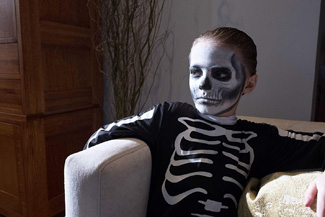Movie Review: The Prodigy
By Matthew Huntley
February 19, 2019
BoxOfficeProphets.com

Subtitles inform us the story opens in Ohio (why the location matters, I’m not really sure), where a frightened, panicking, bleeding woman (Brittany Allen) runs away from a rural house, crosses a field, and screams to another woman driving by, who nearly hits her, “He took my hand!” “He” is Edward Scarka (Paul Fauteux), a deranged sociopath we first hear chanting a sinister verse. Police arrive at Edward’s house shortly thereafter and shoot him dead when he attempts to pull a gun.
Cut to another rural house, this one in Pennsylvania (again, the location seems irrelevant), where Sarah (Taylor Schilling, of Netflix’s “Orange is the New Black”) and John (Peter Mooney), a mid-30s married couple, are expecting their first child. Sarah’s water has just broken and John drives her to the hospital, where she gives birth to a boy named Miles, right around the same time police shoot Edward in the neighboring state.
A few years pass and Miles (Jackson Robert Scott) has proven he’s intellectually gifted, although there’s just something just off about him. He’s withdrawn, lacks friends, and suddenly begins showing signs of disobedient and disturbing behavior. Plus, the family dog doesn’t like him, and because dogs are always the first to know when something is awry in a horror situation, we know this child isn’t all right.
When Miles’ conduct gets more ominous and rebellious, Sarah and John decide to take him to a therapist (Colm Feore), who places Miles under hypnosis and discovers…well, I probably don’t have to tell you what he discovers given what I’ve already summarized about the plot, not to mention it’s obvious “The Prodigy” has all the makings of a derivative horror movie, drawing inspiration from others like it such as “The Omen” and “Birth.”
However, despite the confines of the genre or the influence of its brethren, I believe “The Prodigy” still could have gone in a more meaningful, earnest direction, one that might have challenged the audience to think and really contemplate the difficult decisions of the characters. If director Nicholas McCarthy had taken the ideas proposed by Jeff Buhler’s screenplay seriously, and if Buhler’s screenplay went further by flushing out said ideas to make the story more about the characters’ psychology and morals, and not just about some sinister child wielding sharp objects who goes around stabbing and cutting people, we might have really had something here.
Another issue is the pacing. The movie seems like it’s in a hurry to get done, which made me wonder if editors Tom Elkins and Brian Ufberg actually had more footage at their disposal but were instructed to keep trimming the film down in order to give it a brisk 100-minute runtime. A handful of scenes suggest Buhler’s script contained additional character backstory, and therefore more overall substance, such as when the therapist relays his diagnosis of Miles to Sarah and John; or when Miles ignites his father’s temper and we see that John has an abusive side that might have been passed down from his own father; or when Sarah realizes there’s a reprehensible act she could commit that might save her son from evil.
All of these moments make us think “The Prodigy” could have been a thoughtful, dramatic thriller, one that asks us to deliberate over what we would do if we were in the characters’ situation. But it rushes through them and ends up settling on being just another routine, sensational horror movie. It’s unfortunate, too, not least because Schilling and Scott’s performances are particularly strong and consequently go to waste, but also because it doesn’t give us much else to take away. Sure, there are some mild shocks here and there, along with some effectively gruesome scenes that make us squirm in our seats, which is one of the points of horror, but the overwhelming thought we have is “The Prodigy” was a missed opportunity, which keeps the reputation for this time of year being Hollywood’s dumping ground well intact.